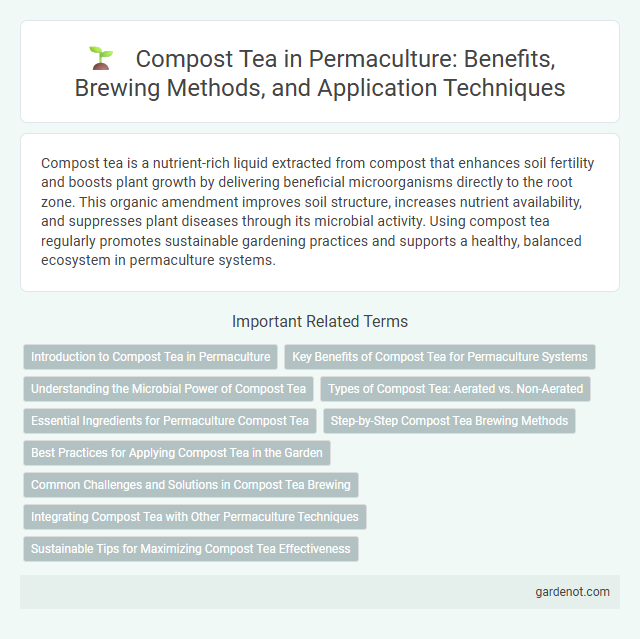Compost tea is a nutrient-rich liquid extracted from compost that enhances soil fertility and boosts plant growth by delivering beneficial microorganisms directly to the root zone. This organic amendment improves soil structure, increases nutrient availability, and suppresses plant diseases through its microbial activity. Using compost tea regularly promotes sustainable gardening practices and supports a healthy, balanced ecosystem in permaculture systems.
Introduction to Compost Tea in Permaculture
Compost tea in permaculture is a nutrient-rich liquid produced by steeping compost in water, enhancing soil fertility and plant health. This bioactive solution teems with beneficial microorganisms that improve nutrient uptake and suppress plant diseases naturally. Using compost tea supports sustainable gardening by promoting a balanced soil ecosystem without relying on chemical fertilizers.
Key Benefits of Compost Tea for Permaculture Systems
Compost tea enhances soil fertility by introducing beneficial microorganisms that improve nutrient cycling and plant health within permaculture systems. It increases soil aeration and water retention, promoting robust root development and resilience against pests and diseases. Regular application supports sustainable ecosystem balance, leading to higher crop yields with reduced chemical inputs.
Understanding the Microbial Power of Compost Tea
Compost tea harnesses the microbial power of compost by extracting beneficial bacteria, fungi, and other microorganisms through aerated water infusion, significantly enhancing soil health. These microbes improve nutrient availability, suppress plant pathogens, and promote robust root growth by creating a balanced soil ecosystem. Research shows regular application of compost tea can increase crop yields and improve plant resilience against environmental stressors.
Types of Compost Tea: Aerated vs. Non-Aerated
Aerated compost tea is brewed using oxygen pumps to promote beneficial aerobic microbial growth, enhancing nutrient availability and disease suppression in soil. Non-aerated compost tea ferments without added oxygen, resulting in a different microbial community that can be richer in anaerobic bacteria and fungi but may produce harmful pathogens if not carefully managed. Understanding these differences helps permaculture practitioners select the appropriate compost tea type to improve soil health and plant growth sustainably.
Essential Ingredients for Permaculture Compost Tea
Permaculture compost tea requires key ingredients like mature compost rich in beneficial microbes, oxygenated water to promote microbial life, and natural sugars or molasses to fuel microbial growth. Incorporating seaweed extract or fish hydrolysate enhances nutrient content and microbial diversity, vital for soil health and plant resilience. Proper ratios and aeration during brewing ensure a potent, nutrient-dense tea that supports sustainable, regenerative gardening practices.
Step-by-Step Compost Tea Brewing Methods
Compost tea brewing begins by soaking high-quality compost in non-chlorinated water at a ratio of one part compost to five parts water, allowing beneficial microorganisms to activate. Aerate the mixture continuously using an aquarium pump for 24 to 48 hours to promote aerobic microbial growth, which enhances nutrient availability in the tea. Strain the liquid through a fine mesh to remove solids before application, ensuring a nutrient-rich, microbe-dense solution ideal for improving soil health and plant vitality.
Best Practices for Applying Compost Tea in the Garden
Apply compost tea during early morning or late afternoon to maximize nutrient absorption and reduce UV degradation of beneficial microbes. Use it within 24 hours of brewing to preserve microbial activity, applying as a foliar spray or soil drench for enhanced plant growth and disease resistance. Avoid overapplication by following recommended dilution rates, typically 1:10 to 1:20, to maintain soil microbial balance and prevent nutrient runoff.
Common Challenges and Solutions in Compost Tea Brewing
Common challenges in compost tea brewing include maintaining the optimal temperature range of 65-75degF to promote beneficial microbial growth and preventing contamination from harmful pathogens. Ensuring adequate aeration through continuous oxygenation addresses the risk of anaerobic conditions that can spoil the tea. Utilizing quality compost with diverse microbial populations and controlling brewing time between 24-48 hours enhances nutrient extraction and microbial efficacy.
Integrating Compost Tea with Other Permaculture Techniques
Compost tea enhances soil fertility by introducing beneficial microorganisms that boost plant health and resilience, complementing techniques such as mulching and companion planting in permaculture systems. When combined with sheet mulching, it accelerates organic matter decomposition, improving nutrient availability and water retention in the soil. Applying compost tea alongside rainwater harvesting maximizes microbial activity, promoting sustainable, self-sufficient garden ecosystems.
Sustainable Tips for Maximizing Compost Tea Effectiveness
Compost tea enhances soil health by delivering beneficial microbes and nutrients directly to plants, boosting growth and resilience. To maximize its effectiveness, maintain aeration during brewing to prevent anaerobic conditions and use high-quality organic inputs like worm castings and diverse compost. Applying compost tea during early morning or late afternoon ensures optimal microbial activity and nutrient absorption by plants.
Compost tea Infographic

 gardenot.com
gardenot.com